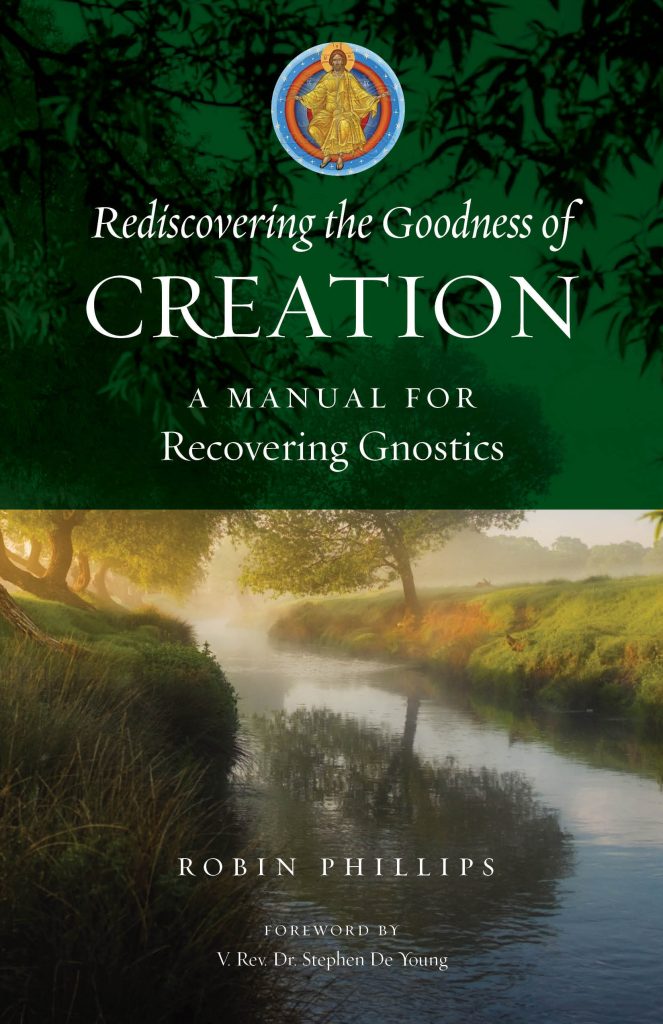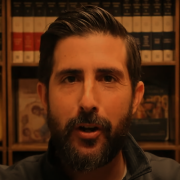
“In this thoughtful and well-written book, Robin Phillips offers valuable analysis of a serious theological error surprisingly prevalent among many Christians: modern Gnosticism. Phillips reveals how many concepts popular in present-day culture distort and misrepresent the true Christian understanding of creation, the human person, and other critical matters, resulting in spiritual harm and false presumptions. Drawing important distinctions between contemporary Western thought and the actual views found in the Bible, Phillips artfully combines historical explanations with real-world examples while demonstrating that the affirming, holistic, and balanced beliefs of the early Church have been preserved in Orthodox theology and spirituality.” —Dr. Jeannie Constantinou, host of Search the Scriptures Live on Ancient Faith Radio and author of Thinking Orthodox and The Crucifixion of the King of Glory, both published by Ancient Faith Publishing.
“It’s likely we are all recovering Gnostics, given the widespread belief that the world of matter is inherently opposed to the things of the spirit. Robin Phillips’s book is an excellent guide to extricating oneself from that confusion, and for coming to see that all of creation is charged with God’s presence.”—Khouria Frederica Mathewes-Green, author.
“Robin Phillips’s work makes a valuable and timely contribution to understanding the goodness of God’s creation and particularly mankind. He offers a corrector to the modern and ancient misunderstandings of fallen creation and the place of the body in salvation history. Phillips’s presentation is clear and accessible to all readers. May this work be blessed by God and may all who use it be edified.” —Bishop John, Antiochian Orthodox Bishop of Worcester and New England.
“Robin Phillips’s journey from his Gnostic Christianity is such a dramatic portrayal of the attraction of new creation that it puts Dan Brown in the shade. Read it with your family and friends and see how God is calling us to a new view of creation.” —William Dyrness, senior professor of theology and culture at Fuller Theological Seminary and author of The Facts on the Ground: A Wisdom Theology of Culture (2022).”
Gnosticism seems the perennial heresy, one that asks us to think about our relationship with God as something that occurs only in “the spirit,” or awaits some final and perfected denouement that is only tacitly realized now and without roots in the present life. The Gnostics of the ancient Church in their various guises preached a secret knowledge that liberated us from the lie that is our bodies and the present world. Consequently, the beauty of the Liturgy, nature around us, and all good things God has given to us to enjoy, had no place in their theology. For many Christians this is still the case, whether it be crass emotionalism in worship, a disdain for the visual in piety (i.e., icons), or a religion that is largely intellectual in nature. Such things are a corruption of the apostolic deposit, ones that Robin Phillips takes head-on, and to which he gives no quarter, in a study sorely needed in today’s world.” —Cyril Gary Jenkins, Van Gorden Professor of History at Eastern University (retired).
“It is urgently important that we Christians in the United States take more seriously the implicit charges of apostasy leveled against us by Harold Bloom in The American Religion. Bloom argued that American Christians—not just some of us, but all of us—have mistaken the stone of Gnosticism for the original Christian Gospel. Was Bloom perhaps right? The careful and comprehensive account presented here by Robin Phillips helps us answer that question by striking at the heart of American Gnosticism—its conviction that the earth and the body have no future in God’s Kingdom. Phillips’s account of a creation primed for sacramental transfiguration has implications for Christian engagement with ecology, culture, art—and more.” —Dr. Timothy Patitsas, dean of Hellenic College, professor of ethics at Holy Cross Seminary, and author of The Ethics of Beauty.
Phillips beautifully explains that everything we do in this life can be done for God’s glory, as a coordination with His ongoing efforts to reclaim, renew, and refashion the world. One of the highlights of the book for me is how Phillips describes these efforts of the Lord, working with and through the patriarchs and prophets to gradually extend His realm in the world, leading up to His death and Resurrection which throw open the doors of Paradise to everyone. . . . He encourages us to experience how this vision for life in Christ can transform our marriages, our occupational lives, our artistic endeavors, our friendships, our economic dealings, even our household chores. And for Christians who have been affected to some degree by the old Gnostic disparagement of matter, he encourages us to beauty in church architecture and furnishings, to return to celebrating the church year, and to return to sacramental/liturgical worship.
Phillips presents the traditional cosmic understanding of the redemption of mankind as well as of all of creation with rich and plentiful use of the Scriptures, the writings of the Church Fathers, liturgical texts, as well as contemporary literature of varying viewpoints. The result is a thoroughly interesting and edifying vision of the fullness of life in Christ, in harmony with His creation, that is possible in this world—a life which already participates in the ever-hoped-for glories of eternal life in heaven.” —Dr. David C. Ford, professor of church history, St. Tikhon’s Orthodox Seminary.
“Rediscovering the Goodness of Creation is a remarkable work. It is first an intellectual autobiography, as Robin Phillips describes his gradual shedding of the Gnosticism that pervades so much of American Christianity, and now secular thought, and his discovery of the perennial and central Christian teachings of the resurrection of the body and of the coming of a new heaven and the new earth. He finds this in Orthodox theology, a tradition that many Protestants have thought downplayed such things. This story is complexly interwoven with biblical exegesis, reflections on patristics, church history, and historical theology, yet the result is lucid and engaging reading. —Paul Marshall, author of Heaven Is Not My Home and the Wilson Professor of Religious Freedom at Baylor University.
“This is a deeply personal book—and therefore has something real and profound to offer. Robin Phillips calls us to allow the reality of Christ’s victory to penetrate our daily lives. In Christ, we must not reject the material world but rather must rejoice in new creation and anticipate bodily resurrection. Through critical engagement with the Gnostic heresy, biblical exegesis of Adam-Israel-Christ, and liturgical practice in seeing the world rightly, Phillips develops an Orthodox vision of God’s Edenic paradise reconquering the “wilderness” of this fallen world through the power of the Gospel. Inspiring!”—Matthew Levering, James N. Jr. and Mary D. Perry Chair of Theology, Mundelein Seminary, former president of the Academy of Catholic Theology, and co-editor of the International Journal of Systematic Theology.
“Ancient Gnosticism’s repudiation of the physical world has found echoes, Robin Phillips shows, in much of contemporary Christianity. He lays out evidence for this assessment, expounds on how the history of redemption laid out in Scripture indicates God’s delight in His creation, urges Christians to welcome their physicality as basic to who they are and to their redemptive hope, and calls them to discern how this should reshape their approach to life, faith, and vocation. This engaging and wide-ranging book deserves a wide audience. —James R. Payton Jr. Professor of Patristics and Historical Theology, McMaster Divinity College (Hamilton, Ontario) and author of The Victory of the Cross: Salvation in Eastern Orthodoxy
“Robin Phillips succinctly depicts the problem of modern man as ‘caught in the pincer grip of materialism and the machine . . . hungry for the sublime and the symbolic.’ As humanity becomes more and more cut off from the created world and its inherent goodness, neo-Gnosticism is in the air again. Even otherwise well-meaning Christians are unknowingly taking this in. To them, creation is considered unimportant, soon to be destroyed anyway, and our culture left abandoned, either as beyond hope or unimportant in spreading the Gospel. And even our physical bodies are disregarded and divorced from spirituality. As Robin was himself led away from this toxic understanding of creation as he became Orthodox, he is able to guide his readers along the same path with depth and clarity. He reminds us that Christ’s work of redemption does indeed redeem everything, and we can approach our bodies, our work, our culture, our world through the light of His Resurrection as things that have deep meaning and importance. Nothing is lost.” —Very Rev. Archimandrite Seraphim, Abbot of Holy Cross Monastery in West Virginia.
“Robin Phillips creatively addresses an old heresy too infrequently acknowledged, namely, the Gnostic denigration of creation, which sadly persists in many forms in the Church today. Combining his own story as a “recovering Gnostic” with perceptive cultural analysis, spot-on readings of the Bible, and astute insights from the Christian tradition, Phillips articulates a strong case for, as the title indicates, rediscovering the goodness of creation. In addition to a robust presentation of the biblical story of new creation, Phillips provides helpful practical advice on “how not to be Gnostic.” A very fine book. Take up and read.” —Steve Bouma-Prediger, Leonard and Marjorie Maas Professor of Reformed Theology, Hope College.


